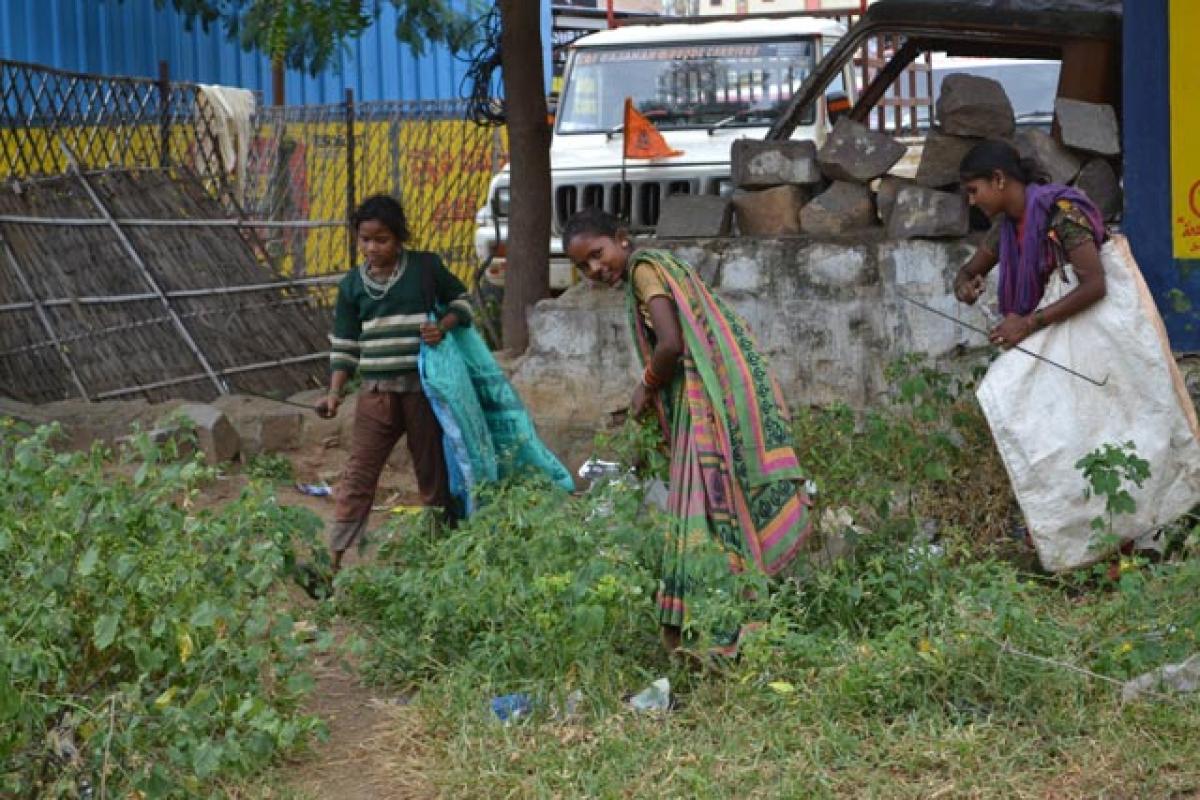Live
- Actor Sri Tej Accused of Cheating by Woman
- Constitution Day 2024: Celebrating India's Foundational Document
- 'When you lose, EVMs are tampered with; when you win, EVMs are fine', SC dismisses PIL
- India signs Final Act of Riyadh Design Law Treaty
- Oppn leaders protest outside Bihar Assembly over reservation, smart meter issues
- Best performances of Nandita Das that prove she’s an acting powerhouse
- Top 5 Plumbing Tips for Better Water Conservation
- Four students hurt in clash over ragging in Bhagalpur Engineering College
- Search operation continues to locate railway officer swept away in Arunachal river
- Is Telangana's Air Quality Worse Than Delhi's? TPCB Shares Real-Time AQI Data and Improvement Plans
Just In

They set off to work even before sunrise. Venturing into every nook and corner of the town, they collect trash such as cans, plastic and other recyclable waste from public dumps.
Sangareddy: They set off to work even before sunrise. Venturing into every nook and corner of the town, they collect trash such as cans, plastic and other recyclable waste from public dumps. They do this for 6 hours before segregating and selling the materials to dealers for a low price. They go home by noon and return to the streets, only to work a double-by begging for the rest of the day. This is the life of female rag pickers (women and children) in Sangareddy, most of who belong to one particular community.
‘Pochammalollu’ have traditionally been hunters for centuries. They were also extremely religious people who worshiped various gods and local deities, taking active part in religious festivities. Just like many nomadic tribes settling in cities and municipal areas in the past few decades, even these people came down to Sangareddy more than four decades ago to earn their livelihood, if not, to beg for it.
Along with poor families from other weaker sections, Pochammalollu were also given small pieces of land by the government to build their own houses in a colony which later on became a slum named Marx Nagar. Very few families which initially settled there have multiplied and currently official data suggests there are about 70-100 households living there. However, there are multiple families which live in a single household, in alarmingly unhygienic conditions.
While women, along with their children go for ragpicking, earning anywhere between Rs 100- 150 per day, men go for hunting wild boars and other game animals. After work hours, they get together to go on a different mission- begging. Women carrying the idols of deities in baskets placed on their heads, they walk the streets playing drums, while men whip themselves begging for alms. Even children accompany them.
In some families women carry their infants and beg on the streets. This practice has been going for generations and doesn’t seem to cease, as these people have become habitual beggars now. Parents make babies for the sole purpose of helping them beg. In every house one can see half a dozen children, mostly babies. Children are married-off before they turn thirteen.
Though these girls don’t wear sacred yellow threads or other evidence of being married, they do wear sarees. Almost all the girls look malnourished and also become pregnant at a very young age. Most of the deliveries are non-institutional and are done at their homes, putting the new babies and mothers’ lives at grave risk.
According to the Anganwadi workers in Marx Nagar, at least one baby dies in the colony every month either at the time of delivery or in the next few days, as they do not seek medical help. Many men in the community practice bigamy even in present times. Alcoholism is rampant in the community. Men, women and even little children are addicted to adulterated toddy, which is easily available at many outlets in Sangareddy (including the toddy compound which lies right next to Sangareddy rural police station).
Shockingly, even mothers feed their babies with adulterated toddy to put their babies to sleep. No child goes to school but mysteriously they are registered as regular students in a nearby government school. The grandparents, parents and apparently the children are averse to education.
According to Sangareddy police, children from this community are encouraged by their parents to steal from people in vegetable markets and other crowded places.
In the past efforts were made to rescue these children (Project Muskaan), but no results could be achieved, as parents crashed the gates of an orphan home where the children were kept after being rescued and they created ruckus at the police station as well. “Rescue is not the only solution, though it is essential. There has to be a comprehensive rehabilitation plan for children as well as their parents. Various departments need to come together to address this problem and we will continue our efforts to achieve the same,” said Ratnam, District Child Protection Officer.
It is true that these people can’t be rehabilitated without addressing their economic problems. However, one thing which can be seen in the community is their hard working nature, whether it is ragpicking or begging. There is consistency in their work. People from the community want the administration to take steps to accommodate women in cleaning or garbage management works in the municipality and give their husbands tricycles to do the same.
The people are also having terrible civic issues in the basti and with no public representative or official visiting their basti, they have lost hope that the system is sincere about solving their problems. Somewhere the municipal administration also needs to converge with the district administration in solving the community’s problems. N Moti, Project Director, Women Development and Child Welfare, assured the Hans India that in the days to come, a joint campaign would be initiated with other line departments to address the issue of women and children of Pochammalollu community.
By Vivek Bhoomi

© 2024 Hyderabad Media House Limited/The Hans India. All rights reserved. Powered by hocalwire.com







